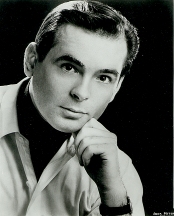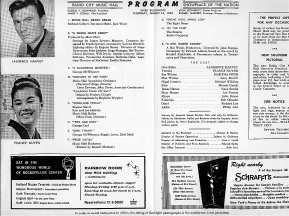
The First and Only Weekly Online Fanzine Devoted to the Life and Works of Edgar Rice Burroughs |
 |

The First and Only Weekly Online Fanzine Devoted to the Life and Works of Edgar Rice Burroughs |
 |

Many bizarre events occurred at New York's Radio City Music Hall, both in front of and behind the great gold curtain. I worked there off and on for ten years during the 60s and held the dubious distinction of having once worked for an entire year of 365 consecutive days without missing a single performance, of which there were more than 1500. In those days the performers worked seven days per week, giving four shows per day during the Christmas and Easter seasons. It became a home away from home, and we had our own cafeteria, infirmary, dressing rooms and, of course, movie-preview rooms where we saw new films during our break periods between shows.When a new show was being staged, we arrived at 4:00 A.M. to take advantage of the facilities before the movie crowds arrived at 10:00 A.M., and got home at 11:00 P.M. after the day's work. There was no such thing as a swing-shift, a six-day week, or sick leave. If you missed a performance for any reason, your paycheck was docked. And if you were featured in any special routines (as I often was) you were catapulted into a higher income bracket which netted you less "take-home pay" than ordinary choristers got.
But all this changed with Penny Singleton, the famous "Blondie" of the movies, who got herself elected Vice-President of AGVA (the performing union for variety artists), and set out to rectify working conditions for the Music Hall singers, Rockettes, and Corps de Ballet. Before her advent, the Mafia had run the union and lined their own pockets with the proceeds. Penny Singleton discovered vast files of unanswered letters when she took office. Her predecessors had held up all incoming mail to a strong overhead light. If there was a check inside for membership dues or residuals, it was immediately opened and the check cashed. All other letters were ignored. With this money, the Mafia built a large estate on Long Island where they held "receptions" which were tax-deductible.
Pulling no punches, Singleton declared open warfare on these underhanded tactics, vowing to "clean up the union or perish." Her first step was to wade into the sea of unanswered mail, and then to send a letter to the Mafia demanding an accounting for every dime spent from union funds. Her reply from the Mafia was swift and to the point. It told her to "cease all investigations" or she would find herself at the bottom of the East River in a pair of cement shoes. Undaunted, she submitted the letter to the New York Times for publication and then wired the Mafia the following message: "Now the world knows. Come and get me!" It worked. The management at Radio City, however, refused to negotiate better working conditions for its performers, so in 1968 we all gathered to vote on whether or not to go on strike. After all, we were still being paid the minimum scale inaugurated in 1933 when the Music Hall was built, and there had never been a strike in its entire history. We voted "yea" and set up a strike headquarters at the Wellington Hotel on Sixth Avenue near Central Park. Louise Thompson became our strike captain. She was also captain of the Rockettes, and a delightful and efficient organizer.
On that far-off day when the Music Hall was built in the heart of the Great Depression, Coe Glade and Titta Ruffo had opened the first stage show with excerpts from Carmen. Over the years, such distinguished singers as Jan Peerce, Leonard Warren and Robert Merrill had graced its stage. The "Flying Walendas" came with their breathtaking trapeze act; Joyce Kuoko, the "Baby Ballerina," performed endless pirouettes to appreciative audiences; contortionist Mary Beth Olds sat on her own head to groans of disbelief; and first-rate composers like Ferde Grofe wrote immortal music for the big Leon Leonidoff extravaganzas. Young acting hopefuls like Gregory Peck were Music Hall ushers. The "Rockettes" became a household word. Their founder and trainer, Russell Market sold the copyright to their name for one million dollars when the Music Hall went on strike.
In some ways, we all felt it was the beginning of the end for the "Showplace of the Nation." Penny Singleton had made similar reforms at New York's famous Latin Quarter, after which it was forced to close down for insolvency. She next attacked Las Vegas (known affectionately as "Glitter Gulch"), but the gambling casinos held too firm a grip on the entertainment industry to suffer financial loss, so her reforms were effected without difficulty. But back in New York the Music Hall remained the last stronghold in town where tourists could still get a movie and a stage show with enough money left over to catch a bus back to Podunk.
I remember those picket lines in front of Radio City Music Hall. We were all keenly disappointed when the orchestra members crossed our lines to play for the shows while we marched in the December cold. We had supported them in all their strikes with the musician's union, and felt betrayed by their actions. "Labor versus Management" became the cry . . . and Management was personified in the President of the Radio City Music Hall Corporation, whose name was Mr. Gould. While other performers were marching with placards and slogans decrying our poor working conditions, I devised my own brand of vengeance, aimed directly at Management. I lettered a brilliantly colored sign which I thought ingenious. It read: ALL THAT GLISTERS IS NOT GOULD! (Shakespeare's The Merchant of Venice, Act 2, Scene 7, line 65.) One of the Rockettes stared at it for a long time, and then timidly suggested that I had misspelled "glisten." Then Penny Singleton appeared and tactfully explained that our purpose was not to "single out personalities" and to get rid of the sign. I did so grudgingly, but with the ultimate conviction that she was right. We had to keep our noses clean.
The strike continued and we marched in all kinds of weather. Our lawyers went into arbitration for an unprecedented two and a half months before an agreement was reached. The rest is history. We got our six-day week, our swing shift, and higher pay, and then began counting the days before we would be out of a job. And the days were not many. The first reform was to play "canned music" for the shows, during which a minimal number of the old-guard performers were hired to fill the stage and move our mouths as though actually singing the canned music. Then the splendid Corps de Ballet, trained by Bettina Rosay, was terminated, following which the singers were let go. The Rockettes managed to hang on, and most of us still recall the national press coverage relating their battle for survival.
But an era had passed. The Music Hall would never be quite the same again. Those wonderful Christmas shows with live camels, horses, donkeys, cattle and sheep, marching to Bethlehem! Sadie, the chief camel on the mock-route to Bethlehem, had always been a true show camel. Whenever she heard a certain martial strain from the orchestra she immediately broke into the "Hucklebuck" and had to be restrained. Every Christmas, as regular as clockwork, she reared up on her hind legs to go into her act whenever the orchestra played "Oh Come, All Ye Faithful." The audience thought she was skittish, but we knew better. Her trainer (disguised on stage as a Judean shepherd) had his hands full trying to curb her enthusiasm. But for one show, during the 1963 Christmas season, Sadie became ill and had to be replaced by a younger and less experienced camel. With malice aforethought, one of the Rockettes crept into the animal room backstage and severed her halter two-thirds of the way through with a razor blade (Rockettes occasionally require diversion). When the grand procession to Bethlehem began, the camel's halter snapped in twain and she bolted across the footlights onto the front apron overlooking the orchestra pit. She was finally subdued , but not before she relieved herself on the musicians beneath. Pandemonium reigned, the gold curtain descended prematurely on the scene, and the orchestra struck up "Silent Night" while a long-handled broom mysteriously appeared from beneath the gold curtain, stage center, to mop up the mess. It was a memorable pageant and the audience was enchanted.
I worked there for several years more, and stored up many more memories, but they'll have to wait for a full length novel. I've always remembered Penny Singleton's advice not to "single out personalities," so I will have to wait until I'm of a more venerable age before writing a complete memoir of my ten years at the Music Hall. By that time, no one will be able to separate fact from fiction, and personalities will have been forgotten. It's true that I was once recognized in the south of France by an American tourist who'd seen me at the Music Hall, so I will have to settle for this fleeting bit of fame. But I often think of that naughty Rockette who cut the camel's leash. Will she someday publish her memoirs? I wonder.
~ George T. McWhorter
RADIO CITY MUSIC HALL PROGRAMMES

Issue 0634
BILL HILLMAN
Visit our thousands of other sites at:
BILL & SUE-ON HILLMAN ECLECTIC STUDIO
ERB Text, ERB Images and Tarzan® are ©Edgar Rice Burroughs, Inc.- All Rights Reserved.
All Original Work ©1996-2004/2010 by Bill Hillman and/or Contributing Authors/Owners
No part of this web site may be reproduced without permission from the respective owners.